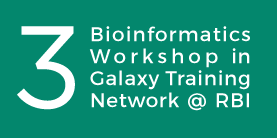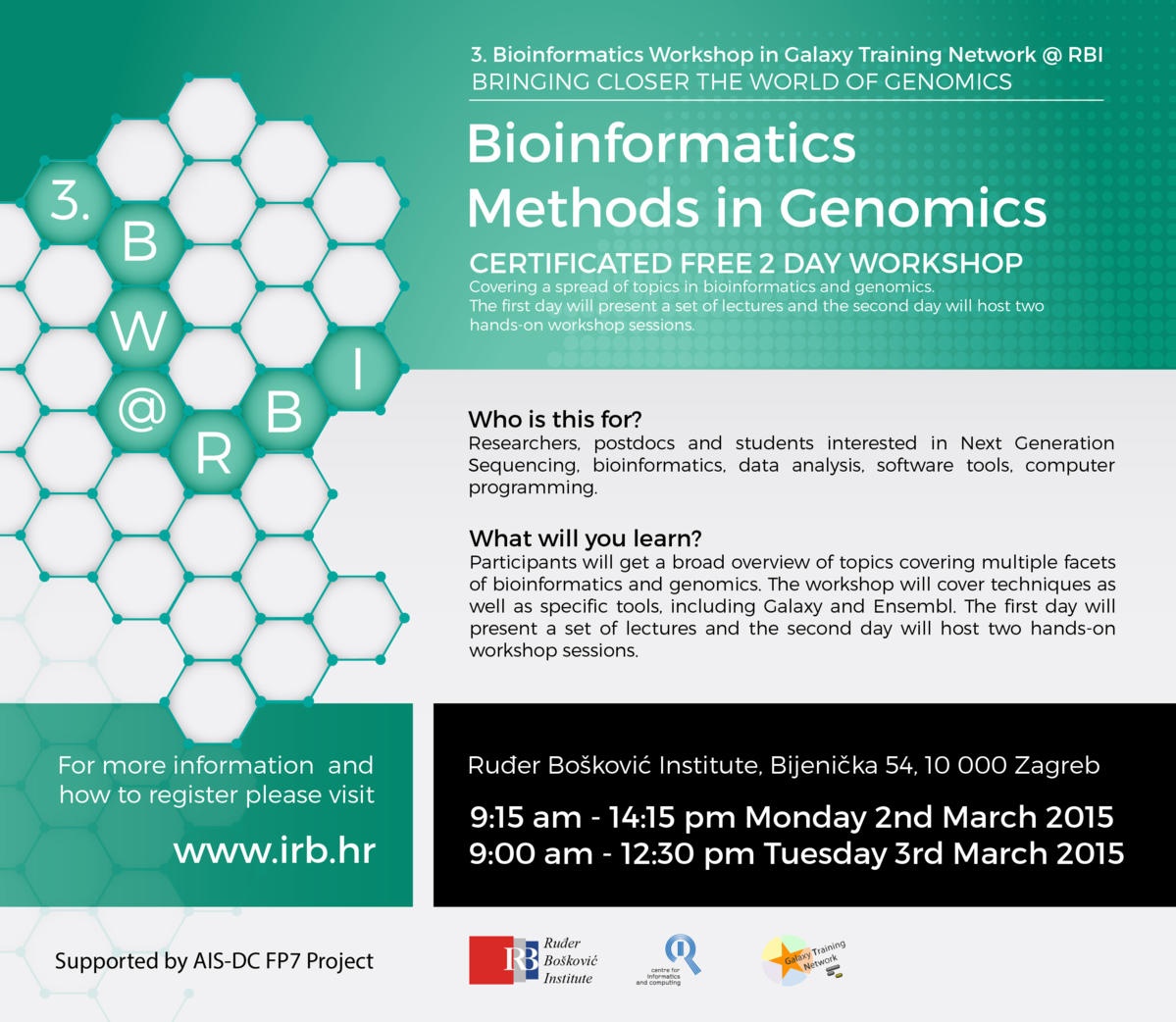Due to a large interest a Webinar has been organized that will be following all lectures on 2nd March. You can attend the WEBINAR by starting the video below on Monday 2nd March at 9:15 am.
Videos can now be downloaded on:
Bioinformatics Methods in Genomics - part 1
Bioinformatics Methods in Genomics - part 2
A 2-day workshop covering a spread of topics in genomics. The first day will present a set of lectures and the second day will host two hands-on workshop sessions.
Who is this for?
Researchers, postdocs and students interested in Next Generation Sequencing, bioinformatics, data analysis, software tools, computer programming.
What will you learn?
Participants will get a broad overview of topics covering multiple facets of bioinformatics and genomics. The workshop will cover techniques as well as specific tools, including Galaxy and Ensembl. The first day will present a set of lectures and the second day will host two hands-on workshop sessions.
When: 2nd and 3rd March, 2015
Where: Ruđer Bošković Institute (RBI), Bijenička c. 54, Zagreb
Programme Day 1 |
Monday 2nd March, 2015
Location: Plava dvorana (Blue Room), 3rd wing |
|
Lectures: |
9:15 - 9:30 |
Welcome and workshop overview
Enis Afgan (RBI) |
|
9:30 - 10:15 |
Introduction to genome assembly and annotation
Maša Roller (PMF) |
This lecture will give a brief overview of methods for de novo genome assembly and annotation. The topics covered will include next-generation sequencing methods, the whole genome shotgun method, de novo genome assembly, genome annotation and repeat masking. The main goal is to help users understand what type of data is available in online genome browsers and how it is prepared. |
|
10:15 - 11:00 |
Overview of ChIP-Seq
Rosa Karlić (PMF) |
This lecture will provide an introduction to ChIP-Seq, a technique used to determine DNA-binding sites of proteins or locations of modified histones on a genome-wide scale. We will give a brief overview of the standard ChIP-Seq protocol and the basic steps of ChIP-Seq analysis pipelines, including quality control, data normalization, peak calling and differential binding analysis. We will also mention several databases where publicly available genome-wide ChIP-Seq data can be accessed. |
|
11:00 - 12:45 |
Break |
|
|
|
|
12:45 - 13:30 |
Mitochondrial DNA next-generation sequencing
Hansi Weissensteiner (Medical University of Innsbruck) |
The mitochondrial DNA being present several 100 to 1,000 fold per cell plays a crucial role in various diseases. This lecture will give an overview on this small genome, with focus on data processing from next-generation sequencing (NGS): targeted sequencing, whole genome and exome sequencing. A free pipeline for aligning NGS data and the automatic processing and annotation with focus on quality control will be presented. |
|
13:30 - 14:15 |
A scalable genotype imputation service
Sebastian Schoenherr & Lukas Forer (Medical University of Innsbruck) |
Genotype imputation is a key step in the analysis of genome-wide association studies (GWAS). However, imputation into large GWA studies requires expertise and substantial computational resources. To keep imputation broadly accessible, we designed a web service (called Imputation server) based on Cloudgene, a graphical Hadoop MapReduce workflow manager. This approach allows to impute GWAS data following the MapReduce paradigm without directly sharing the reference panel. In this talk we will give an overview on MapReduce, Cloudgene and the developed imputation-as-a-service approach. |
|
|
|
|
|
|
|
|
|
Programme Day 2 |
|
Tuesday 3rd March, 2015
Location: Library computer classroom, 5th wing |
|
Workshop 1 |
9:00 - 10:45 |
Introduction to RNA-Seq analysis with Galaxy
Enis Afgan & Davor Davidović (RBI) |
In this hands-on computer introductory seminar, you’ll learn the basics of differential gene expression for RNA-Seq data. We will analyze RNA expression data from two tissues (e.g., cancer vs. normal) using Galaxy - an excellent online data analysis tool. In the process, participants will also be introduced to the Galaxy application. |
10:45 - 11:00 |
Break |
|
|
|
|
Workshop 2 |
|
|
11:00 - 12:30 |
Introduction to genome browsers using Ensembl
Maša Roller (PMF) |
This practical session will introduce you to the basic usage of genome browsers, using the Ensembl genome browser as an example. We will explore gene, transcript and protein views of genomes. You will learn to find variation and homology information through the Ensembl genome browser. |
|
|
Official language is English.





